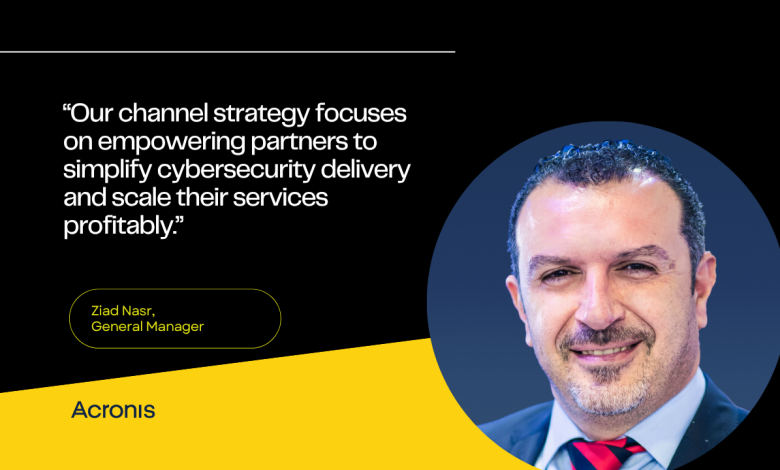“Ongoing Training is Critical”

Ziad Nasr, the General Manager of Acronis Middle East, says partners must continuously upskill to keep pace with threats like AI-generated attacks
Could you share an overview of your career path to date, highlighting the pivotal moments or achievements that have shaped your leadership within the IT channel?
I’ve spent over 25 years building a career in the Middle East technology sector, with a focus on driving growth, leading change, and creating long-term value for customers, partners, and teams. Today, I serve as the General Manager for the Middle East at Acronis, where I lead our mission to deliver comprehensive cyber protection through our partner ecosystem.
Throughout my career, I’ve prioritized both customer and employee satisfaction, with a strong focus on compliance, integrity, and sustainable growth. Before joining Acronis, I served as Managing Director at Middle East Smart Solutions, where I focused on empowering SMEs with technology services tailored to their specific needs.
I hold a master’s degree in computer engineering, and I’ve built my expertise in communications, relationship management, strategy design and execution, and sales transformation.
As a key channel influencer within your company, what are your primary roles and responsibilities in shaping strategy, driving engagement, and fostering growth within the partner ecosystem?
At Acronis, our channel strategy focuses on empowering partners to simplify cybersecurity delivery and scale their services profitably. We provide comprehensive cybersecurity training and certifications, ensuring partners are equipped with the latest knowledge to combat threats such as ransomware and insider attacks.
We also help partners expand their services through co-managed security offerings, enabling them to deliver 24×7 monitoring and incident response without the need to build large in-house SOCs. Our goal is to reduce partner complexity, accelerate their go-to-market, and foster long-term resilience and growth across the ecosystem.
How would you assess the current health and evolution of the IT channel, particularly within our region? What significant trends or shifts are you observing?
The channel is undergoing a major shift from transactional engagements to strategic advisory roles. Partners are evolving into cybersecurity and resilience consultants, helping businesses adopt Zero-Trust architectures, managed security services, and AI-powered detection models to proactively defend against sophisticated threats.
Another key trend is the platformisation of cybersecurity. Many partners are moving their customers away from fragmented tools toward unified cyber-resilience platforms, guided by a cybersecurity maturity model. This transition simplifies management, accelerates response, and promotes a proactive security posture—helping both partners and end-users evolve beyond reactive defense.
What do you see as the single biggest challenge facing the IT channel in the region today, and conversely, what is the most significant untapped opportunity for partners?
The biggest challenge is resource and skills constraints. Building a fully staffed, 24×7 security operations center is not feasible for most partners. The opportunity lies in embracing co-managed security services. Vendors like Acronis can enable partners to deliver advanced security monitoring and incident response without needing to maintain large internal teams. This model helps partners meet rising customer expectations while creating new recurring revenue streams.
In your opinion, what are the most effective strategies partners can employ to drive sustainable growth and profitability in the current market, especially considering evolving customer demands?
Driving sustainable growth in today’s market requires simplification and strategic enablement. Partners should work closely with vendors to streamline licensing and pricing models, making it easier to deliver services without administrative complexity. They should also engage in joint go-to-market initiatives such as co-branded marketing and lead generation programs, which help expand market reach and build stronger customer pipelines.
Providing customers with early access to new technologies and threat intelligence is another way partners can differentiate themselves and stay ahead of the competition. Additionally, partners should focus on helping their customers adopt a cybersecurity maturity model. This approach guides organizations through the journey from reactive defense to proactive resilience, positioning the partner as a long-term trusted advisor rather than just a technology provider.
How is the rapid advancement of AI, including Agentic AI and Generative AI, fundamentally reshaping the channel’s business models, partner opportunities, and the skill sets required for success?
AI is fundamentally transforming how cybersecurity is delivered and managed. Partners must now integrate AI-powered threat detection into their services to keep pace with increasingly sophisticated threat actors. This shift is pushing the channel toward managed security service models, where AI continuously analyzes threats and automates protection in real time. To succeed in this new landscape, partners need to upskill their teams, not only in technical AI capabilities, but also in strategic incident response and cybersecurity architecture design.
Given the escalating sophistication of cyber threats, how can channel partners best position themselves to deliver comprehensive cybersecurity solutions, moving beyond traditional offerings to address emerging risks like AI evasion?
To address today’s sophisticated threats, partners must deliver integrated cyber resilience solutions, not just standalone products. This means building Zero-Trust architectures, leveraging AI-driven threat detection, and offering co-managed security services that provide 24×7 protection without extensive internal overhead.
Partners also need to expand into cross-border disaster recovery and immutable data protection. With geopolitical risks increasing, securing customer data across multiple clouds and regions is essential. Acronis provides geo-redundant DR options, immutable storage, and ransomware protection to ensure recovery remains possible even during state-sponsored attacks or infrastructure failures.
Ongoing training is critical. Partners must continuously upskill to keep pace with threats like AI-generated attacks, positioning themselves as trusted advisors who protect not just against malware but against disruption in all its forms.
Environmental, Social, and Governance (ESG) factors and sustainability are gaining prominence. How can channel partners integrate these principles into their operations and offerings to create competitive advantages and meet evolving client expectations?
Sustainability is becoming a clear expectation from customers and employees, and for channel partners, it’s also a chance to differentiate. Environmentally, we focus on efficiency. With Acronis Cyber Protect Cloud, partners can consolidate multiple tools into one platform, reducing hardware use, energy consumption, and their overall footprint.
In 2024, we calculated our own carbon footprint and introduced a tool that helps partners estimate the CO₂ emissions linked to their use of Acronis products, making it easier to track and reduce their impact.
We also put strong emphasis on responsible business practices. From supplier onboarding to compliance training, we ensure ethical standards are met across areas like human rights, anti-corruption, and environmental responsibility.
Social impact is a key part of our partner engagement. Through initiatives like CSR-in-a-Box, partners can lead cyber safety education in their local communities. Our #TeamUp Foundation Program enables joint projects such as school construction, IT skills training, and volunteering, helping partners strengthen community ties and make a lasting difference. ESG is not a separate effort, it’s built into how we help partners grow efficiently and responsibly, while serving the communities around them.
The IT landscape demands continuous learning. What advice do you have for channel partners on attracting, developing, and retaining top talent, particularly in areas like AI, cloud security, and specialized industry solutions?
The most critical factor is investing in ongoing cybersecurity training and certification programs. Partners that prioritize education and skill development not only close the talent gap but also enhance employee retention by creating clear career growth pathways. This is especially crucial in fast-evolving areas like AI and cloud security. For example, MSPs in our region who completed Acronis Academy certifications achieved a 60% increase in revenue and a 40% reduction in incident resolution times, underscoring the real ROI of workforce development.
How do you see the roles of different partner types—such as Managed Service Providers (MSPs), Independent Software Vendors (ISVs), and system integrators—evolving, and how can they best collaborate to deliver integrated solutions?
Today, all partner types are moving toward a strategic advisory role. Managed Service Providers are expanding their services into MSSP models, delivering continuous security monitoring and response. ISVs are embedding cybersecurity capabilities directly into their platforms, creating more secure software ecosystems. System integrators are helping businesses implement end-to-end cyber resilience solutions that integrate across infrastructure, applications, and security operations.
The most successful partnerships will come from collaboration between these partner types to deliver fully integrated solutions. By working together, they can combine infrastructure, software, and security services into a single, cohesive offering that addresses the evolving cybersecurity needs of modern enterprises.
Drawing from your experience and looking ahead, what is your most crucial piece of advice for partners seeking long-term success and relevance in this rapidly transforming IT channel?
Partners must embrace a shift toward platform-based cyber resilience strategies. Guiding customers to consolidate their fragmented security tools into unified platforms will create operational efficiencies and strengthen defense capabilities. Applying a cybersecurity maturity model helps partners and their customers progress from reactive defense postures to proactive resilience.
At the same time, partners must adopt advanced security architectures such as Zero-Trust, invest in AI-powered detection and response capabilities, and continually upskill their teams to address new and evolving threats. These steps are essential for partners to maintain their relevance and become indispensable, long-term security advisors to their customers in a rapidly transforming digital landscape.




